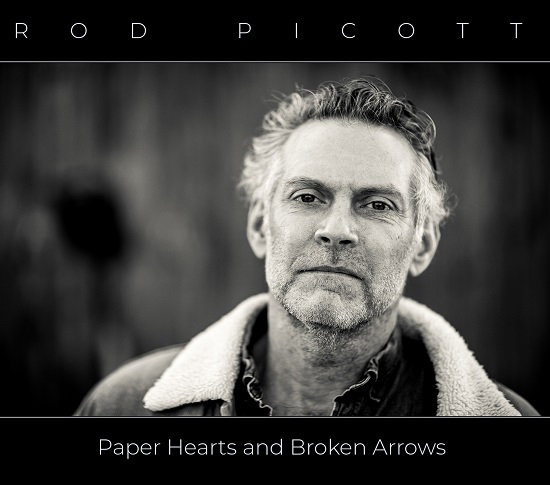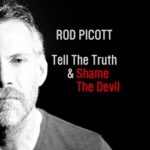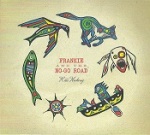
Every so often, an album comes along that isn’t just a great collection of songs played beautifully; an album that pushes a few personal buttons and maybe touches a few raw nerves as well. Rod Picott’s ‘Paper Hearts and Broken Arrows’ is one of those albums that creates a very personal connection. Maybe it’s an East Coast thing between Maine in the USA and Fife in Scotland; you don’t need to look too hard to see the parallels and ‘Washington County’ paints a picture of an area where genteel resorts sit side by side with poverty-stricken former industrial towns and villages. They’re three thousand miles apart, but it’s the same experience.
Just taking a step to one side for a moment, as music has moved into the digital realm, so have some of the ways of getting it out there and letting people know about it. It’s not so long since review copies arrived as CDs (or vinyl if you want go back a bit further) with an A4 press release, through the letterbox. Now they arrive in your inbox and an artist or PR team can include much more material with no extra distribution costs. Which means that artwork and credits, additional photos and lyric sheets are fairly common now and there’s a relatively recent addition of the artist’s ‘track-by-track’ notes. Reviewers should rely more on their ears and instincts than press releases, but you can sometimes pick up a useful insight into the artist’s vision. In the case of Rod Picott, there’s always something worth reading when he puts fingers to keyboard.
The story behind ‘Valentine’s Day’ on this album is a perfect example. It’s a very honest song, painfully so, that’s stripped back to the raw basics of acoustic guitar and cracked vocal. Rod’s notes tell us that the original recording was a full band version that sounded “wonderful – and completely wrong”, like “an Eagles track with a guy that can’t really sing”; the arrangement was too perfect and in Rod’s words again, “for me, perfect is almost always wrong”. Producer Neilson Hubbard liked the stripped-back version and three takes later it was in the can.
There are a couple of strands that run through the album, Rod’s acceptance of a spell of single life that surfaces in the opening song ‘Lover’, ‘Valentine’s Day’ and ‘Mona Lisa’ where the loneliness exists for creatives even inside a relationship, and the autobiographical songs ‘Lost in the South’ and ‘Mark of Your Father’ which both reference his background and his father with ‘Lost in the South’ using his father as a jumping-off point for Rod’s early experiences in the South, while ‘Mark of Your Father’ explores the complicated nature of father-son relationships using Marvin Gaye as an example of how bad things can really get.
And then there are a few songs taking their inspiration from other areas. The dark and menacing ‘Revenuer’, with its dirty guitars and screaming slide solo is inspired by a Taylor Brown novel and explores that thin line between right and wrong when your choices are limited and times are hard. ‘Frankie Lee’ is an outlaw song where the main character always accepts his ultimate fate as the electric chair and, like a lot of Rod’s more stark songs, wouldn’t sound out of place on The Boss’s ‘Nebraska’ (and I know I’ve made that link before).
Rod’s a fan of boxing and ‘Sonny Liston’ is a song that pulls at some of the threads running through a lot of Rod’s work. Sonny Liston was a complex character, torn between the world he came from and the dubious world of professional boxing and gangland connections that he joined without ever gaining the respect of either. The man who took his world title, Cassius Clay/Muhammad Ali is better remembered now, but the Sonny Liston story is full of loose ends, links to organised crime, drugs, sudden death and astonishing sporting prowess. Rod weaves all of these strands into a powerful and economic narrative with a simple alliterative and assonant chorus: “Two big fists pumping like pistons, nobody punched like Sonny Liston”.
Fourteen albums in, Rod Picott is still pushing at the boundaries of his craft, still looking for ways to create songs that mean something, to him and to his audience. Let’s not use the word ”perfect” to describe ‘Paper Heart and Broken Arrows”; let’s go with an outstanding collection of beautifully-crafted songs delivered by outstanding musicians and a singer whose voice cracks with power and emotion. OK with you?
‘Paper Hearts and Broken Arrows’ is released in the UK on Friday June 10on Welding Rod Records.
No videos yet for songs on the album, but here’s a link to a live performance of the fabulous ‘Rust Belt Fields’:
 A new Rod Picott album is always something to look forward to. He’s an exceptional songwriter and his voice is a very effective vehicle for delivering those songs. It’s a voice that’s frayed around the edges and at times crackles with emotion. On “Tell the Truth and Shame the Devil”, Rod has stripped his delivery back to just guitar, harmonica and voice; oh, and the songs. Just to give this some context, the album was recorded after a health scare Rod had over the last winter (although not all of the songs are contemporary) and has a stark, sometimes brooding, feel mingled, unsurprisingly, with intimations of mortality, including the opening song “Ghost”, a brutally honest assessment of Rod’s current situation, and that of many others in similar positions. Confessional, hard-hitting singer-songwriter isn’t a particularly lucrative career path these days.
A new Rod Picott album is always something to look forward to. He’s an exceptional songwriter and his voice is a very effective vehicle for delivering those songs. It’s a voice that’s frayed around the edges and at times crackles with emotion. On “Tell the Truth and Shame the Devil”, Rod has stripped his delivery back to just guitar, harmonica and voice; oh, and the songs. Just to give this some context, the album was recorded after a health scare Rod had over the last winter (although not all of the songs are contemporary) and has a stark, sometimes brooding, feel mingled, unsurprisingly, with intimations of mortality, including the opening song “Ghost”, a brutally honest assessment of Rod’s current situation, and that of many others in similar positions. Confessional, hard-hitting singer-songwriter isn’t a particularly lucrative career path these days.
Rod recorded the entire album alone, without an engineer, before handing the tapes over to Neilson Hubbard (you might remember him if you’re a MusicRiot regular) for final production. If you want a benchmark, the finished article has the same feel as The Boss’s “Nebraska” and has similar lyrical themes of family, poverty and alienation. The result of this method is that the songs are stripped to their very essence with no distractions, emphasising the stories they have to tell and, as always with Rod Picott, they’re striking and memorable stories.
As a writer, Rod likes a metaphor; the murder ballad “Too Much Rain” uses a barren landscape to represent the failure of a marriage to blossom, while “Bailing” uses the idea of bailing literally and metaphorically, referring back to a flooded childhood cellar as a metaphor for the futility of activity that only serves to keep us in the same place. Rod also likes to bring a bit of autobiography into the mix; “Mark” is the story of an unexplained teenage suicide, while “Spartan Hotel” is that bar in any town where anything goes if you can pay the price. And don’t forget the social comment; “A Beautiful Light” aims straight the heart of those songwriters who try to glamourise the drudgery of blue-collar life as a means of social control.
This is the third Rod Picott album we’ve reviewed here and they’re consistently powerful pieces of work blending punchy stories of small-time America with haunting melodies in a voice that is both emotive and vulnerable. It’s probably the most personal of his recent albums and well worth a listen.
“Tell the Truth and Shame the Devil” is out now Welding Rod Records and Rod will be touring the UK in October.
 Concept album? Well. I’m not quite sure that’s an adequate description for Rita Hosking’s sixth studio album, “Frankie and the No-Go Road”. You can just take it at face value as a collection of twelve beautifully-crafted songs, delivered with stripped-back folk/Americana arrangements and a striking, sometimes fragile but always impassioned, voice; it’s all of those things but it’s much more as well. The album takes the popular mythological theme of the questing hero and weaves this through the fabric of our journey through life while interleaving mystical and mythological references from various cultures. Each of the songs has a subtitle relating to the progress of the mythological hero, Frankie (whose gender isn’t specified) through their heroic quest.
Concept album? Well. I’m not quite sure that’s an adequate description for Rita Hosking’s sixth studio album, “Frankie and the No-Go Road”. You can just take it at face value as a collection of twelve beautifully-crafted songs, delivered with stripped-back folk/Americana arrangements and a striking, sometimes fragile but always impassioned, voice; it’s all of those things but it’s much more as well. The album takes the popular mythological theme of the questing hero and weaves this through the fabric of our journey through life while interleaving mystical and mythological references from various cultures. Each of the songs has a subtitle relating to the progress of the mythological hero, Frankie (whose gender isn’t specified) through their heroic quest.
But before we go any further, let’s hear it for the guys in the band; Rich Brotherton (playing virtually everything plus production and backing vocals), Glen Fukunaga (upright bass), Don Wynn (drums, percussion), Sean Feder (dobro, djembe), Kora Feder (harmony vocals) and Andy Lentz (violin) supply masterfully understated backing for Rita’s guitars, banjo, harmonica and vocals, creating an understated soundscape that evokes “Harvest” and “After the Goldrush” and perhaps the austerity of Springsteen’s “Nebraska”.
The opening songs “A Better Day” and “Wetiko” set the scene for the album; “A Better Day” is a delicate exposition, gently identifying a malaise in the writer’s life and creating the link with fictional hero Frankie. Rita’s voice, with a hint of vibrato, and the mournful harmonica create an aura of melancholy which is crying out for resolution. “Wetiko” identifies the malaise with the Native American concept of a parasitic psychosis, devouring the individual from within, relying on a sparse banjo/drums/bass arrangement to evoke menace and malice. As the album progresses the two narrative strands are woven ever tighter with episodes of denial (“Magic Carpet”) and resolve (“I See Storms”) before the quest reaches its crisis.
“Black Hole”, with its hints at a support group meeting and “Mama Said” reveal that the demons are within and always have been. The telling image is that of a dog dying of thirst but afraid to drink because of his reflection in the water in “Mama Said”; once that fear is overcome by a leap of faith, then the journey becomes easier. The quest continues with the hazardous journey home, challenges to the outcomes, and a sharing of the lessons learned in “Sing” which finally reunites the two narrative strands with a simple solution; put your faith in the natural world and express yourself freely.
“Frankie and the No-Go Road” is a fascinating and haunting piece of work; the instrumentation is sparse and the vocals powerful, yet simultaneously vulnerable, pulling us in to two narratives linking the inner and outer worlds. It’s an ambitious concept, but the deliberate musical understatement and complexity of the narratives and themes create a tremendously satisfying album which occupies the mind long after the last notes fade away.
“Frankie and the No-Go Road” is released in the UK on Friday October 30th.


